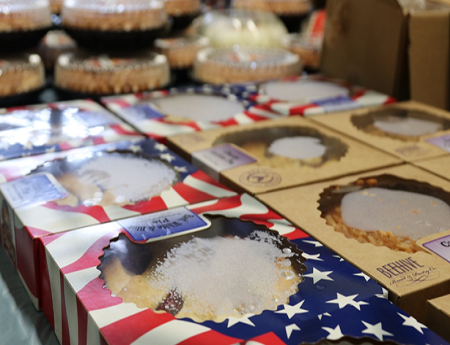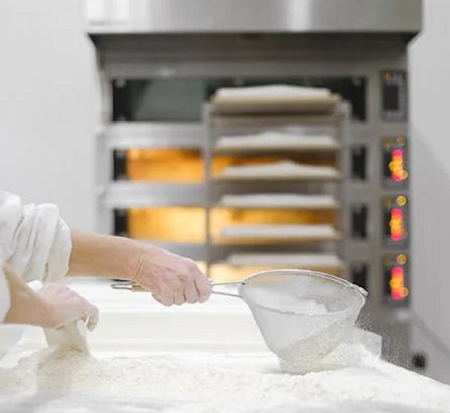The Benefits of a Commercial Bakery for Owners and Consumers
 When people hear the word “commercial” or “commercialism,” they have negative feelings toward whatever it applies to. However, owning or buying from a commercial bakery has many benefits for both the business owner and consumers alike.
When people hear the word “commercial” or “commercialism,” they have negative feelings toward whatever it applies to. However, owning or buying from a commercial bakery has many benefits for both the business owner and consumers alike.
What is a Commercial Bakery?
A commercial bakery, also known as a wholesale bakery, functions much like a retail home bakery. The main difference is the scale and how the bakery interacts with the consumers of their baked goods. A commercial bakery can have the homestyle feel and quality of a small home-based bakery, but it tends to work with other companies and interact with customers more indirectly and on a larger scale.
Quality of Commercial Bakery
Some may worry that buying from a commercial bakery means sacrificing quality for convenience. However, many large bakeries in the United States started as homespun bakeries, which continue to strive to maintain the standards of excellence set by their founders. These types of bakeries are often referred to as homestyle bakeries because they use home recipes handed down through the generations.
Commercial bakeries strive to deliver top-notch products by using local ingredients, implementing strict quality checks, and following industry guidelines. They analyze ingredients closely and use advanced tools to assess the texture and appearance of their baked goods. In addition to this, commercial bakeries are required to meet certain standards set by the American National Standards Institute (ANSI) and the American Society of Baking, which ensure that the facilities in which the goods are baked are kept clean and safe. So, you never have to worry about sacrificing quality when buying from a commercial bakery.
Benefits of a Commercial Bakery
Bakeries, in general, have much to offer individuals and the communities they serve. Both the business owner and the consumer benefit from a local bakery, but both sides see even more benefits when that same local bakery is able to upscale to a commercial level.
Benefits for Consumers
No one likes when their favorite baked goods are sold out, but this can often occur when dealing with a small bakery, especially if the item is particularly popular. However, because commercial bakeries tend to have more staff and use technologies to regulate and speed up the baking process, this is far less likely to happen, even with high-demand goods.
Commercial bakeries also tend to offer more affordable goods at competitive prices. And because many commercial bakeries supply local grocery stores and supermarkets with their baked goods, buying their products is more convenient because the consumer doesn’t have to go out of their way to find what they are looking for. A commercial bakery also has the ability to offer a wider variety of goods compared to their smaller baking counterparts. They can expand their menu to include goods that fit dietary needs, such as products made with organic ingredients or gluten-free options.
However, consumers aren’t the only ones who benefit from large-scale bakeries.
Benefits for Business
Bakery owners who decide to upscale their business to a commercial bakery experience many benefits as well. Chief among these is that no matter what community they are in, the demand for baked goods remains relatively high, providing a steady income source. Many of these larger bakeries find opportunities to expand their business and increase profits, either by opening new locations or selling their goods in wholesale markets. Also, diversifying their product allows them to be more creative while providing for a variety of tastes and dietary preferences. Ingredients for their products can be relatively inexpensive, essentially when bought locally. Bakeries also offer opportunities for community engagement, allowing them to give back while fostering loyalty and building customer relations. Commercial bakeries can also white label or private label their products for other brands and wholesale businesses.
Private Labeling and White Labeling in a Commercial Bakery
Sometimes, prospective business owners wish to start up a bakery of their own but lack the infrastructure to do so. This is where private labeling and white labeling come in.
White labeling, in the baking industry, involves a process where manufacturers mass-produce baked goods that are then sold to multiple retailers under a different brand name. This allows retailers to offer their own branded baked goods without needing in-house production facilities. This can save business owners time and money in product development and manufacturing costs. This model is particularly beneficial for retailers looking to expand their product offerings quickly and efficiently.
Private labeling, on the other hand, is similar to white labeling, except that the products are sold through one retailer exclusively, and their products are generally higher.
Conclusion
Upscaling to a commercial bakery not only benefits business owners, but it allows them to better provide for their customers’ needs, and gives them opportunities to benefit their communities as well. Their homestyle quality products are more affordable than small bakery prices, and their streamlined processes allow them to consistently keep high-demand goods in stock. This allows for a better customer experience and builds trust with the business to meet their needs. These are just a few of the numerous benefits commercial bakeries offer to all those who interact with them, making them a valuable asset in the food industry.
